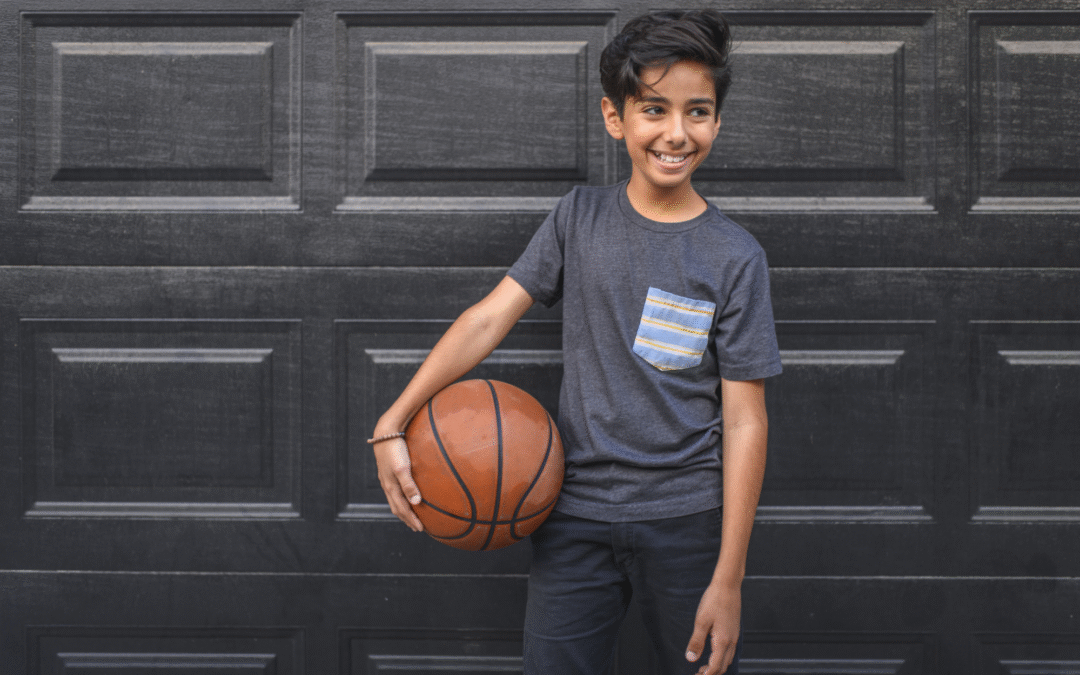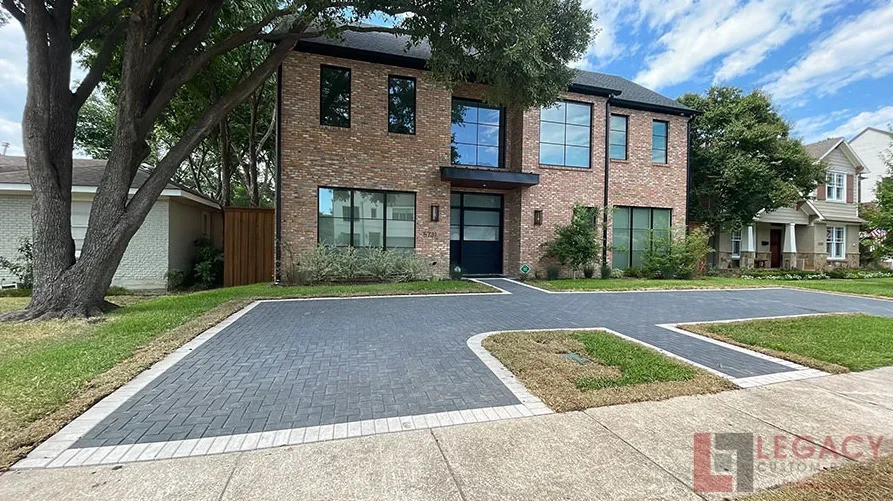Creating Active Family Paver Driveways By Setting Up A Summer Basketball Court
Plano, United States - August 18, 2025 / Legacy Custom Pavers and Outdoor Living /
Thinking about a summer basketball court, but don’t want to pour concrete or drive across town to play? Look no further than your paver driveway. That flat, grippy surface is already on its way to becoming your family’s favorite hangout spot.
Pavers handle the heat, deliver a consistent bounce, and don’t crack like concrete. Best of all, you don’t have to give up your parking space. With thoughtful planning, your driveway can be both a clean place to park and an awesome court for shooting hoops all summer long.
When you work with experienced professionals who understand both sports functionality and driveway requirements, you get a space that works hard for your family year-round. Let’s explore how to make it happen.

Why Paver Driveway Basketball Works So Well
Think about what makes a great basketball surface. You need consistent bounces, good traction for quick moves, and a level playing field that won’t twist ankles or create weird ball deflections.
Concrete sounds good in theory, but reality tells a different story. Those expansion joints create dead spots where the ball barely bounces. Cracks develop over time, especially in our Texas clay soil. And when concrete gets wet? You might as well be playing on ice.
Pavers solve all these problems naturally. The interlocking design means no expansion joints to mess with your dribble. Individual stones can shift slightly with soil movement without creating dangerous cracks or uneven spots. Plus, the joints between pavers help with drainage – your court dries faster after those summer thunderstorms.
Smart Basketball Hoop Installation for Paver Surfaces
The foundation of any great home court starts with choosing the correct hoop setup. You’ve got several options, but not all of them work well with paver driveways.
Portable vs. In-Ground Systems: Portable hoops offer flexibility – roll them out for games, tuck them away for easy car access. Most quality paver installations can handle the weight just fine, especially if you use wheeled bases designed to distribute pressure evenly.
In-ground systems provide the most authentic playing experience, but they require careful planning. The key is working with your paver installer from the beginning so the court layout and hoop placement work together perfectly.
- Portable hoops: Great for multi-use driveways
- Adjustable height systems: Perfect for growing families
- Wall-mounted options: Save space while providing solid play
- In-ground permanent: Best playing experience for serious players
Weight Distribution Tips: Even the sturdiest paver installation needs proper weight distribution. Sand or water-filled bases should use wide footprints rather than concentrated weight points. If you’re going portable, look for models with wheels designed for paver surfaces—hard plastic wheels can chip individual stones over time.
Creating Your Family Sports Driveway Layout
Smart court design makes the difference between a cramped shooting area and an authentic basketball experience that your family will enjoy.
- Size Considerations: You don’t need a full NBA court to have serious fun. Most residential driveways are perfect for half-court games, which are often more enjoyable for families anyway. A 30×30-foot area gives you room for real games without overwhelming your space.
- Traffic Flow Planning: Remember, this is still your driveway. Smart families design their courts so cars can access the garage easily, even when basketball equipment is set up. This usually involves planning the court layout to one side or using portable equipment that can be easily moved.
Consider where players will naturally move during games. You want enough buffer space so an aggressive drive to the basket doesn’t end with someone crashing into a parked car.
Multi-Use Design Elements: The best active family driveway setups work for more than just basketball. Your court lines can double as boundaries for other games. The flat, open space is perfect for bike riding, skateboarding, or outdoor parties.
- Court markings that complement paver patterns
- Storage solutions that don’t interfere with parking
- Lighting options for evening play
- Seating areas for spectators and rest breaks
Choosing Pavers for Optimal Ball Handling
Not all pavers perform equally for basketball play. The size, texture, and installation method all affect how the ball behaves on your court.
- Surface Texture Matters: You want enough texture for good foot traction but not so much that it affects ball bounce. Smooth-finished pavers with subtle texture work best. Highly textured surfaces may provide a better grip for walking, but they can create unpredictable bounces that frustrate players.
- Joint Width Considerations: Narrow, consistent joints between pavers create the most uniform playing surface. Wide or irregular joints can catch basketballs and create dead spots, making dribbling difficult.
- Color and Heat Management: Light-colored pavers stay cooler in Texas heat, making summer play more comfortable. Dark pavers look great, but can become uncomfortably hot by mid-afternoon. If you love the look of darker stones, consider the court orientation and typical playing times.
Court-Marketing Strategies That Work
Adding court lines transforms your driveway from a shooting area into a real basketball court. The trick is making markings that enhance play without clashing with your paver pattern.
- Temporary vs. Permanent Options: Chalk works great for families just starting or kids who like changing court designs. For something more lasting, consider paint designed specifically for paver surfaces—it provides durability without permanent commitment.
- Working with Paver Patterns: The best court markings complement, rather than compete with, your paver layout. Sometimes, you can use the natural lines between different-colored pavers as court boundaries. Other times, strategic marketing placement can make pavement patterns look intentional and sporty.
Maintenance That Preserves Both Functions
Your summer basketball court driveway needs a little upkeep to stay smooth for both parking and play.
Quick Cleaning Tips
Sweep weekly to keep grit out of joints and improve ball bounce. Pressure wash monthly for a clean, grippy surface.
Seasonal Must-Dos
- Spring: Check for shifting pavers and hoop hardware.
- Summer: Watch for heat damage.
- Fall: Clear leaves fast.
- Winter: Protect gear and check drainage.
Also:
- Refill joint sand as needed
- Relevel high-traffic spots
- Inspect equipment regularly
A little effort keeps your court safe, sharp, and ready for play.

Making It Happen: Professional Installation Benefits
While some families tackle court setup as a DIY project, working with experienced professionals ensures that your basketball dreams come to fruition in the long term.
Professional installers understand the specific requirements for sports surfaces. They know how to create a level, stable foundation that makes basketball play enjoyable rather than frustrating. Plus, they can integrate your court plans with proper drainage and traffic flow from the beginning.
Legacy Custom Pavers & Outdoor Living has been helping North Texas families create amazing outdoor spaces for over 15 years. Our team knows exactly how to build driveways that work perfectly for both cars and sports, giving your family the best of both worlds.
Frequently Asked Questions
Q: Will basketball play damage my paver driveway over time?
A: Quality pavers are designed to handle much more stress than basketball creates. The interlocking design distributes impact better than concrete, making it more durable for sports use. Proper installation is key to long-term performance.
Q: What size area do I need for a functional basketball court?
A: A 30×30-foot space provides room for real half-court games and shooting practice. Even smaller areas work well for casual play and skill development. The key is planning the layout to maximize your available space effectively.
Q: Can I add court markings to existing paver driveways?
A: Absolutely. Court lines can be added using chalk, temporary paint, or permanent marking solutions. The best approach depends on your family’s needs and how often you plan to use the court for basketball versus other activities.
Q: How do portable basketball hoops work on paver surfaces?
A: Most portable systems work great on quality paver installations. Look for models with wide base footprints and wheels specifically designed for use on textured surfaces. Proper weight distribution prevents damage while providing a stable playing experience.
Q: What maintenance does a basketball court driveway require?
A: Regular sweeping and occasional pressure washing keep both basketball performance and driveway appearance at their best. Seasonal checks of joint sand and equipment hardware ensure everything stays in excellent condition year-round.
Design Your Dream Driveway Court with Quality Pavers
Ready to create the ultimate family basketball experience? Contact Legacy Custom Pavers & Outdoor Living today to discover how we can design and build the perfect driveway that meets your family’s transportation and recreational needs perfectly.

Contact Information:
Legacy Custom Pavers and Outdoor Living
1211 East 15th Street
Plano, TX 75074
United States
Brandon Chaney
(972) 415-3147
https://legacycustompavers.com



